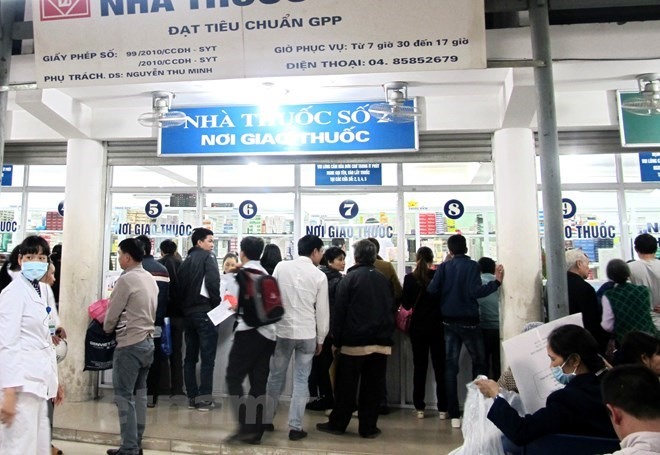 Society
Society

The Ministry of Health (MoH) has begun implementing a plan to strengthen control over drug distribution by applying information technology.
 |
| People queue to buy medicine at a hospital’s drug stall. Most people in Viet Nam buy drugs without a prescription. - VNA/VNS Photo |
HÀ NỘI - The Ministry of Health (MoH) has begun implementing a plan to strengthen control over drug distribution by applying information technology.
The goal of the plan is to connect all drug shops to the internet and manage the distribution of drugs by software in order to transfer information about drug distribution and quality between manufacturers and customers, as well as to management agencies.
This will also be a requirement for importers and drug manufacturers.
Large drug shops are required to apply IT from January 2019, and smaller drug stalls from January 2020.
At present, the MoH is implementing IT application for pharmacies in four provinces including Phú Thọ, Hưng Yên, Nam Định and Vĩnh Phúc. It is expected that, from 2018 to 2020, the project will be expanded nationwide.
According to Vũ Tuấn Cường, head of Drug Administration of Việt Nam under MoH, implementing this project will ensure the traceability of drugs, as well as control the influx of poor quality drugs, drugs of unknown origin and limit the rampant sale of drugs without prescription.
However, pharmacies may face some initial difficulties such as fees for internet or personnel training. As such, some drug establishments will be hesitant to support the project.
“To successfully implement this project, relevant agencies and local authorities should create favorable conditions for drug wholesalers and retailers not to be disturbed in business activities,” said Cường.
The Ministry of Health has also recently specified a list of drugs that can only be sold when the customer presents a doctor’s prescription, in order to distinguish them from non-prescription drugs.
He also stressed that IT application was mandatory; therefore, pharmacies would be penalised if they failed to comply with the new regulations.
At present, the decree on sanctions to administrative violations in the health sector was being amended.
“The ministry will review and supplement violations in the event of failure to comply with IT deployment regulations. Pharmacies will, in some cases, have their business permit and professional pharmaceutical certificate revoked if they don’t play ball," he said.
The ministry’s survey on the sale of antibiotics in drug retailers in rural and urban areas in the north of the country showed that awareness amongst drug sellers and residents about the threat of antibiotic resistance remains low.
About 88 per cent of antibiotics in cities in Viet Nam are sold without a prescription, and the number in the rural areas is even higher, at 91 per cent.
In Việt Nam, antibiotic resistance has reached alarming levels. The use of inappropriate antibiotics or the overuse of antibiotics has increased antibiotic drug resistance to pathogenic bacteria. - VNS